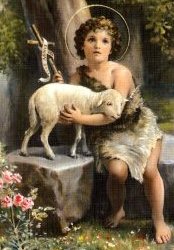Today we celebrate a little Advent “oasis” in the midst of summer, because we celebrate the birth of the forerunner of Christ, the Messiah: St. John the Baptist. With St. John the Baptist’s birth Israel witnessed the first signs of life after centuries of waiting and hoping for salvation.
In today’s First Reading Isaiah envisions the expectation of St. John the Baptist, even while in his mother’s womb, of the lofty mission to which he has been called—the herald of the Messiah. Israel had shared the same expectation for centuries. All of Israel had been waiting for a sign for centuries. When we read the last books written in the Old Testament, we see signs and wonders that occurred centuries before the event we are celebrating today. After spending their whole life awaiting liberation, Israel in the time of St. John was in the hands of a foreign power: the Romans.
In the midst of this, Zachariah and Elizabeth—St. John’s parents—remind us of the fidelity of Israel, but despite them being blameless in the sight of the Lord, God had not blessed them with children. When something like this happened, the Israelites always assumed it meant those suffering from it were cursed by God. Children were one of the greatest signs of blessing for the Israelites. Amidst Zechariah’s worship “routine” (cf. Luke 1:8-17) the sign came: an angel announces to him the answer to his prayers—he would have a son and named him John—and an old woman shows signs of life in her womb as she becomes a mother. Israel was certainly awaiting something flashier—we all like pyrotechnics and special effects (legions of angels, the ground swallowing people up, armies being overthrown), but Zachariah received the sign in private, while worshiping, and only after a lot of prayer.
In today’s Second Reading Paul reminds us that we celebrate St. John the Baptist’s birth today because he was born to herald the coming of the Messiah. John would be the herald of the Messiah, the last prophet, ushering the Old Testament into the New by announcing that the Kingdom of Heaven was at hand, and Israel needed to get ready. John would be the last and greatest prophet. He would see the Messiah begin his saving mission on earth, and also accept that his mission ended as the Messiah’s was beginning.
Today’s Gospel doesn’t mention the reason for Zachariah being mute, but it’s important to understand the context. When the angel appeared to Zachariah and told him he’d be a father Zachariah answered “How shall I know this? For I am an old man, and my wife is advanced in years” (Luke 1:18). His faith wasn’t strong enough, and he was made a mute witness to everything that was about to happen—he saw the angel’s announcement coming true but was unable to tell anyone about it or what had happened to him.
Even though his faith was weak, God still gave him a chance, as we will see. “His name will be John” (cf. Luke 1:13). Signs will come, but they’re always an invitation to go deeper in our faith: God always puts more faith in us than we do in him—he always gives us another chance. Zachariah took his second chance by supporting Elizabeth’s insistence on the name John. The angel had announced “His name will be John” and Zachariah’s second chance at faith by seconding the angel’s words loosed his tongue. Through his faith Zachariah became involved in God’s immense plan of salvation again, and, in turn, his son John became that sign for Israel that the Messiah was coming.
Let’s ask John the Baptist today to help us see where we might be silent spectators regarding God’s plan. What do I think God’s plans are for my life, my family, my corner of the world? How can I give witness to that plan and second it in my own life? Let’s second God’s plans wholeheartedly, enthusiastically, and joyfully, as Zechariah does today, confident that it will help prepare the way for others to encounter the Messiah.
Readings: Isaiah 49:1–6; Psalm 139:1b–3, 13–15; Acts 13:22–26; Luke 1:57–66, 80. See also Birth of St. John the Baptist (2) and Birth of St. John the Baptist.

